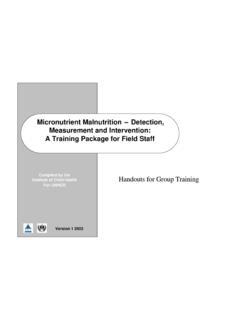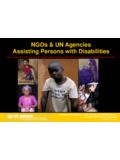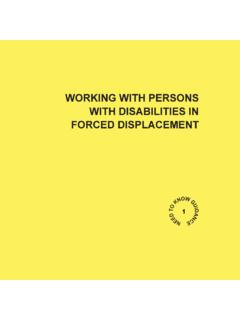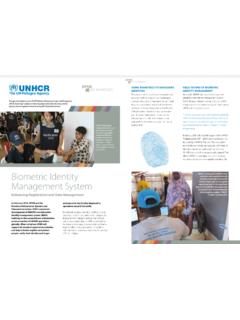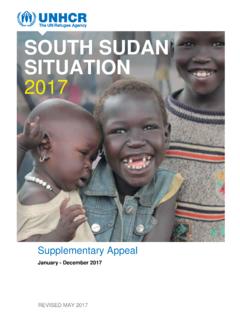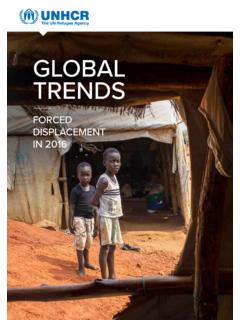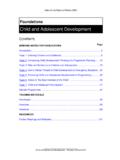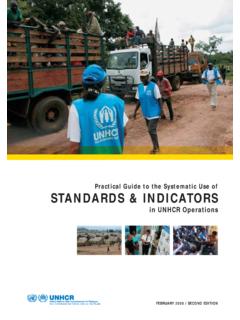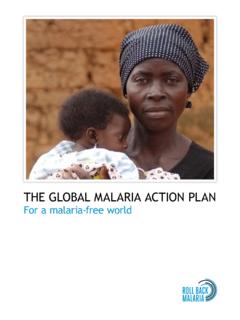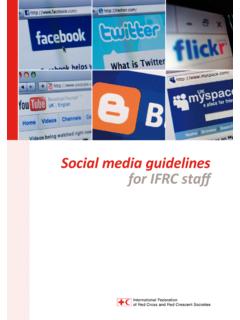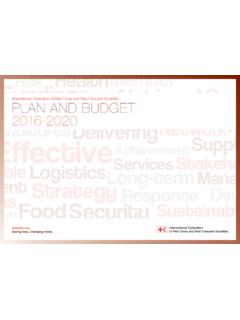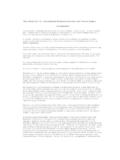Transcription of ON FAITH-BASED FAITH COMMUNITIES AND FAITH …
1 Partnership NoteON FAITH -BASED ORGANIZATIONS, LOCAL FAITH COMMUNITIES AND FAITH LEADERSU nited Nations High Commissioner for Refugees Case Postale 2500, 1211 Geneva 2, SwitzerlandTel: +41-22-739-8111, Fax: +41-22-739-7353, (Research and analysis): Volker T rk, Jos Riera and Marie-Claude PoirierOriginal: English French translation: Catherine DelebecqCover photo: Sudan / IDPs from Abyei in Mayen Abun / The church of Mayen Abun offers shelter to a few hundred persons during the night. Since clashes started in the disputed area of Abyei on 21 May 2011, over 120,000 people have fled southwards. After fighting broke out between the army of Sudan (SAF) and the Sudan s People Liberation Army (SPLA) on May 20, 2011, tens of thousands of people fled the disputed area into South Sudan. In the early days of the crisis, UNHCR provided assistance in the form of shelter, family tracing, and monitoring. Mayen Abun, Turalei and Wau were some of the most important locations where people fled to.
2 UNHCR / A. Zevenbergen UNHCR, 2014 Layout and Design: BakOS DESIGNA cknowledgementsThe development of this Partnership Note in follow-up to the High Commissioner s Dialogue on FAITH and Protection (December 2012) benefited greatly from the enthusiastic support of a number of leading FAITH -based organizations and UN would like to take this opportunity to recognize the tireless efforts of Act for Peace Australia, the Anglican Communion, Caritas Internationalis, Church World Service, HIAS (Hebrew Immigrant Aid Society), International Catholic Migration Commission, Islamic Relief Worldwide, Jesuit Refugee Service, Lutheran World Federation, Rabbis for Human Rights Israel, the World Council of Churches, and World Vision International, and to add a special word of thanks to the following individuals for their time, expertise and invaluable support: Bruno, Fabienne, Carole, Angela, Rano, Mercedes, Faby, Jeff, Helen, Rachel, Firas, Jason, James, Atallah, Mark, Azza, Nava, Ralie, Lisa, Michael, Ramesh, Sally, Angelo, Melissa, Volker, Janet, Ingeborg, Tomas, Elena, Mahmoud, Clare, Beris, Tha s, Fulata, Deepika, Rev.
3 Sugino, Bishop Younan, Nopadol, Alison, Ann, Jozef, Karl, Annabelle, Sybella, Ruth and the was also inspired by the evidence-based research produced by the Joint Learning Initiative on Local and FAITH COMMUNITIES (JLI). Its Scoping Review on Local FAITH COMMUNITIES and the promotion of resilience in humanitarian situations was important to the thinking behind all areas of the follow-up to the Dialogue on FAITH and United Nations Population Fund (UNFPA), the Joint United Nations Programme on HIV/AIDS (UNAIDS), the United Nations Children s Fund (UNICEF) as well as the United Nations Development Programme (UNDP) supported UNHCR s efforts in this area by sharing knowledge and experiences, and through their own extensive consultations and policy-related work. Collaboration on a strategic learning exchange with the United Nations System staff College (UNSSC), UNFPA and UNAIDS also provided UNHCR staff with the opportunity to explore the linkages between FAITH and development, health and humanitarian work, and to share their experience of engaging with FAITH actors in the course of their respective work.
4 The strategic learning exchange took place on 22-24 October 2013 in Rome, Italy and will again be held in 2014 in a location to be determined. This is only the beginning of a long j ou r n e Note on FAITH -based organizations, local FAITH COMMUNITIES and FAITH leaders4 Table of contents1. Background ..62. Purpose ..73. FAITH and humanitarian responses ..84. The challenges of partnership ..95. Good practice examples ..106. Principles to guide UNHCR s partnerships with FAITH actors ..127. Putting partnership principles into practice ..14 Annex A Contributors to the Survey on good practice examples ..17 Annex B Affirmation of and additional resources ..21 The daughter (5 years old) of a woman living with HIV. Her mother says she also likes to stay at the monastery because she can speak freely with other people living with HIV. UNAIDS/Kyaw Kyaw Winn51. UNHCR recently embarked on a journey of mutual discovery with FAITH -based organizations by exploring the role of FAITH in humanitarian responses.
5 In December 2012, the fifth High Commissioner s Dialogue on Protection Challenges was held on the theme of FAITH and Protection. The Dialogue assembled over 400 representatives of FAITH -based organizations, FAITH leaders and other partners for a two-day discussion in Geneva on partnership with FAITH -based This was the first formal multi- FAITH dialogue UNHCR ever engaged in and explored the common values underpinning the notion of refugee protection in all of the world s major religions. It also fostered deeper appreciation for and understanding of the role religion and spirituality plays in the lives of those UNHCR Participants in the Dialogue on FAITH and Protection ffurther recognized the importance of UNHCR s existing and potential partnerships with FAITH -based organizations, especially to improve the protection of person of concern to the organization ( refugees, asylum-sekers, stateless persons and the internally displaced). Participants strongly reaffirmed the key principles underpinning humanitarian work1 ( impartiality, non-discrimination, respect for the beliefs of others, diversity, empowerment, equality, humanity, and protection against any form of conditionality), and acknowledged the need to respond to humanitarian situations according to these At the close of the event, the High Commissioner underscored the valuable contributions that FAITH organizations and COMMUNITIES make to the protection of refugees and the displaced.
6 He highlighted a number of concrete suggestions for follow-up, which included a call to develop guidance on FAITH literacy for UNHCR staff . The present Partnership Note has been prepared pursuant to this For a full description of the principles, see ICRC, Code of Conduct for the International Red Cross and Red Crescent Movement and Non-Governmental Organizations (NGOs) in Disaster Relief , 1995. The Code of Conduct has been subscribed by over 520 Note on FAITH -based organizations, local FAITH COMMUNITIES and FAITH leaders2. This Partnership Note sets out broad guidance for UNHCR staff about engaging with, reaching out to and partnering with FAITH -based organizations, local FAITH COMMUNITIES and FAITH leaders. Given the diversity of contexts in which UNHCR operates, this guidance should be adapted to local circumstances and realities and can be a source of inspiration for the work of the UN, other international organisations, non-governmental and community-based organizations and many The Note: describes UNHCR s understanding of the range of FAITH actors and the role they play in humanitarian responses; flags challenges of partnership and red lines; identifies examples of good practice and lessons learned from existing partnerships in the field; highlights principles that are a point of departure for dialogue and cooperation with FAITH actors and COMMUNITIES ; sets out actions and activities to put these principles into practice.
7 UNHCR / Faso / Goudoubo / Malian refugees get ready to break the fast in Goudoubo refugee camp. The camp hosts some 10,000 refugees who fled a violent conflict that erupted in northern Mali in early 2012. Respecting the traditions at Ramadan time is important for the refugees, who hope to celebrate Ramadan back home next year. UNHCR / H. Caux73. FAITH and humanitarian The United Nations is a secular organization. Since its creation in 1950, UNHCR has nevertheless engaged with FAITH -based organizations, FAITH COMMUNITIES and FAITH leaders in carrying out its work. This partnership has proven its value over the years and yielded substantial protection and other benefits for persons of concern to the Office. Concrete examples are provided throughout this UNHCR is committed to adopting a coherent approach to partnership in this area. These partnerships are especially relevant in cases where FAITH actors play an important role at local level and are actively engaged in meeting the needs of forcibly displaced populations.
8 As active members of civil society, FAITH actors and their organizations can leverage significant social, physical and spiritual assets for the benefit of those UNHCR serves. Strengthening partnerships is further a goal of the wider humanitarian reform process that aims to improve the effectiveness of humanitarian response. Finally, FAITH actors are widely present in all parts of a given country due to their vast networks. Their presence does not necessarily depend upon external or international funding. They often remain long after international attention has faded, and funding has ARE FAITH ACTORS? FAITH -based organizations, local FAITH COMMUNITIES and FAITH leaders vary in size from a group composed of a few believers to global religions and broad inter- FAITH networks. They encompass a range of FAITH identities and motivations, with diverse degrees of knowledge of, willingness and capacity to observe humanitarian organizations is a term used here to describe a broad range of organizations influenced by FAITH .
9 They include religious and religion-based organizations/groups/networks; COMMUNITIES belonging to a place of religious worship; specialized religious institutions and religious social service agencies; and registered or unregistered non-profit institutions that have a religious character or FAITH -based organizations have consistently been among UNHCR s top ten implementing partners. In 2013, the Lutheran World Federation and Islamic Relief Worldwide were amongst UNHCR s top ten international implementing partners, whereas Caritas was amongst the top ten of UNHCR s national FAITH -based organization FAITH COMMUNITIES consist of people who share common religious beliefs and values, and draw upon these to carry out activities in their respective COMMUNITIES . They are often providers of first resort in humanitarian emergencies, mobilizing and providing support through their membership and FAITH networks. Their members are often unpaid volunteers who act because their FAITH calls upon them to do so.
10 They may or may not be aware of basic humanitarian leaders are believers who play influential roles within their FAITH COMMUNITIES and the broader local community. They benefit from trust and exercise moral authority over members of their local FAITH community, and shape public opinion in the broader community and even at the national or international level. Recent examples include the impassioned defence of migrants and refugees and their right to life by Pope Francis in 2013, the mediation role played by the Ukrainian Orthodox Church in early 2014 in the capital, Kiev, and calls for peace by Christian and Muslim leaders in 2014 in the Central African See UNDP, Guidelines on engaging with FAITH -based organizations , The challenges of Partnership is not a unilateral undertaking and must be viewed from the perspective of both UNHCR and FAITH actors. UNHCR, like the broader humanitarian community, is committed to upholding humanitarian principles and ensuring that protection underpins all activities.
